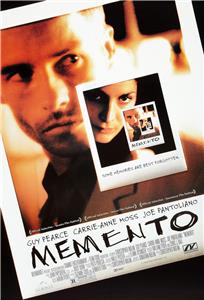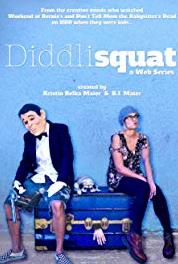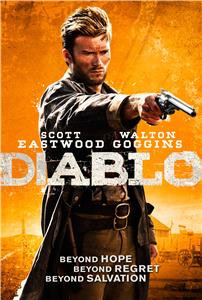A man with short-term memory loss attempts to track down his wife's murderer.
Memento (2000) Online

Memento chronicles two separate stories of Leonard, an ex-insurance investigator who can no longer build new memories, as he attempts to find the murderer of his wife, which is the last thing he remembers. One story line moves forward in time while the other tells the story backwards revealing more each time.
| Complete credited cast: | |||
| Guy Pearce | - | Leonard | |
| Carrie-Anne Moss | - | Natalie | |
| Joe Pantoliano | - | Teddy | |
| Mark Boone Junior | - | Burt | |
| Russ Fega | - | Waiter | |
| Jorja Fox | - | Leonard's Wife | |
| Stephen Tobolowsky | - | Sammy Jankis | |
| Harriet Sansom Harris | - | Mrs. Jankis | |
| Thomas Lennon | - | Doctor | |
| Callum Keith Rennie | - | Dodd | |
| Kimberly Campbell | - | Blonde | |
| Marianne Muellerleile | - | Tattooist | |
| Larry Holden | - | Jimmy |
EASTER EGG: The Limited Edition DVD (and the standard Region 2 edition) allows the movie to be watched in the exact chronological order of the events in the film. The first couple of scenes of the regular cut of the movie appear normal in this version, meaning they are not reversed. However, this version of the movie on Disc 2 is quite difficult to reach (the user must answer several questions and solve a puzzle), and forward, reverse, and chapter skip capabilities are disabled.
The medical condition experienced by Leonard in this film is a real condition called Anterograde Amnesia, the inability to form new memories after damage to the hippocampus. During the 1950s, doctors treated some forms of epilepsy by removing parts of the temporal lobe, resulting in the same memory problems.
During Teddy's line, "You don't have a clue, you freak!" Director Christopher Nolan felt that Joe Pantoliano (Teddy) did not quite nail the end of the line, so he decided to re-record the last two words to his liking, delivering them himself. Therefore, in the final film, the words, "you freak", as we hear them, are actually being said not by Pantoliano, but by Nolan impersonating Pantoliano's voice. Pantoliano was unaware of the dubbing, until an interview for Anatomy of a Scene: Memento (2001).
The film took twenty-five days to shoot.
Stephen Tobolowsky has stated that during his audition for Sammy, he had mentioned to Christopher Nolan that he had experienced amnesia personally. A few years earlier, he was given an experimental pain killer that induced amnesia for a surgery he had undergone. Tobolowsky said it may have helped him get the part, because no other actor would likely have had his first-hand experience.
Christopher Nolan's screenplay was based on his brother Jonathan Nolan's story "Memento Mori." However, the screenplay is still considered original (rather than adapted), because Jonathan's story wasn't published until after the film was completed.
After being impressed by Carrie-Anne Moss' performance as Trinity in Maatriks (1999), Jennifer Todd suggested her for the part of Natalie. While Mary McCormack lobbied for the role, Christopher Nolan decided to cast Moss as Natalie, saying, "She added an enormous amount to the role of Natalie that wasn't on the page."
Although the opening scene is literally shown backwards, every single sound effect is, in fact, a "normal" forward-played sound effect. The only sound played backwards is Teddy screaming, "No!"
Guy Pearce was originally two hundred thirty pounds (104.3 kilograms) before the movie was made, and lost all of the weight within a few months.
According to Christopher Nolan, Carrie-Anne Moss shot her whole part for the film in eight days.
The expiration date on Teddy's Driver's License is 02-29-01, a day that does not exist in reality, since 2001 is not a leap year. However, in the fictional setting of this movie, it does.
Cinematographer Mark Vargo turned down an interview with Christopher Nolan, because he didn't understand the script. He later admitted that this was a mistake.
The test given to Sammy Jankis (Stephen Tobolowsky), involving the electrified objects, is based on a real-life case study of a patient, commonly referred to as HM, who suffered from the same form of amnesia following surgery to treat severe epilepsy. A doctor repeatedly shook HM's hand with a joy buzzer, shocking him every time. After a few trials, HM refused to shake hands. The test, shown in the movie, is an illustration that Sammy's condition was not identical to a real-life case study, but would not have excluded him from insurance coverage.
"Paranoid Android" by Radiohead was originally going to be used in the closing credits, but Christopher Nolan decided that the royalties needed to use this song (owned by Capitol Records) would be too great for this low-budget film.
The film's subject matter was conceived of when Christopher Nolan was joined by his brother Jonathan on a late summer cross-country road trip, as Christopher was moving to Los Angeles and Jonathan had time before returning to his studies at Georgetown to spend time with his brother and help with with the move. By the time they arrived in L.A., the entire screenplay had been stated out loud between the brothers.
Aaron Eckhart, Brad Pitt, Charlie Sheen, and Thomas Jane were considered for the role of Leonard, before Guy Pearce got the part. Christopher Nolan would later work with Eckhart on Pimeduse rüütel (2008).
The tattoo parlor in the movie is named after Emma Thomas, who is Christopher Nolan's wife, and the movie's Associate Producer.
Carrie-Anne Moss personally recommended Joe Pantoliano for the role of Teddy, having become good friends with him while they were working on "The Matrix". Christopher Nolan and his producers had reservations about this because they weren't sure Pantoliano's screen persona (often overtly villainous) was the right match for Teddy, but they met with him and decided his talent made him the right person for the part. Nolan later praised Pantoliano for having brought the right amount of subtlety to his performance as Teddy.
This movie marks the first in a long-time collaboration between Christopher Nolan and Cinematographer Wally Pfister. They would make six more movies together, before Pfister became a director.
Many of Leonard's unique voiceovers were improvised by Guy Pearce.
Christopher Nolan's first choice for the role of Leonard was Alec Baldwin.
Droste Effect on the main poster of the movie is a reference to Doodlebug (1997), another movie by Christopher Nolan.
(At around fifty-five minutes) The book that Leonard's wife is reading, which begins, "Two years have gone by since I finished the long story.", is Claudius the God by Robert Graves.
Memento was considered "culturally, historically or aesthetically" significant by the US Library of Congress and was selected for preservation in the National Film Registry in 2017. It is the Christopher Nolan's first movie to be preserved in National Film Registry. It was also the first non documentary film from the 2000's to be preserved.
Christopher Nolan's white Honda Civic can be seen parked next to Leonard Shelby's (Guy Pearce's) Jaguar at the motel.
Ashley Judd, Famke Janssen, and Angelina Jolie were considered for the role of Natalie.
After Brad Pitt expressed interest in signing up to play Leonard but ultimately had to pass on the project due to other commitments, Christopher Nolan did not consider any other "A-list actors" because he realized that having a talented but lesser-known lead actor would allow for the film's budget to be more evenly distributed. That process led to Nolan nearly casting Aaron Eckhart in the role, and eventually giving the part to Guy Pearce. Nolan would go on to work with Eckhart a few years later in The Dark Knight.
The camera Leonard Shelby uses is a Polaroid 690.
All of the dialogue in black-and-white sequences that feature Sammy (Stephen Tobolowsky) was improvised.
As of 2018, this film and his debut Following (1998) are the only films Christopher Nolan has made that weren't produced by Warner Bros.
Denis Leary turned down the role of Teddy.
The movie was filmed in Southern California, in and around the Sunland and Tujunga area. Other driving scenes were filmed in Burbank, on Victory Boulevard.
Carrie-Anne Moss (Natalie) and Joe Pantoliano (Teddy) worked together in Maatriks (1999). She played the role of Trinity and he played Cypher.
Christopher Nolan wanted Peter Deming to be the film's Cinematographer, but he was unavailable, having already signed on to shoot Scream 3 (2000).
Teddy's (Joe Pantoliano) phone number (555 0134) is same as Marla Singer's (Helena Bonham Carter) in Kaklusklubi (1999).
When we first see Leonard's map of the area, we can see two streets that have commonality with Blue Velvet (1986). There is a "Booth Street", the primary antagonist in Blue Velvet (1986) is Frank Booth. A second street, worthy of note, is "Lincoln Street", which Jeffrey is explicitly told to avoid, and where the apartment of Dorothy Vallens resides in Blue Velvet (1986). These are the only roads that are not nominally numerical, for example "Seventh Street".
In one scene, Leonard quickly passes in front of a comic book store. The Batman emblem is displayed prominently on the store's window. Christopher Nolan later directed Batman alustab (2005), Pimeduse rüütel (2008), and Pimeduse rüütli taastulek (2012). There is also a Superman emblem in the same store window. Nolan was Producer of Terasmees (2013) and is Executive Producer of Batman vs Superman: Õigluse koidik (2016).
The address on Teddy's Driver's License has a non-existent zip code (94181) transposed from an actual San Francisco zip code 94118. The address number on Pine Street (an actual street in San Francisco) shown does not lie inside zip code 94118.
Carrie-Anne Moss and Callum Keith Rennie both appeared on Due South (1994).
The re-release in Barcelona (Phenomena) was in a subtitled version, and a 35 mm copy. It was only projected one day.
After his wife's death, Sammy (Stephen Tobolowsky) is shown sitting in a mental institution. Briefly, just after someone walks in front of him, and before the scene cuts back to Leonard (Guy Pearce) on the phone, Sammy is actually replaced by Leonard sitting in the same chair. This supports the conclusion, that the tragic end of Sammy's story, is actually an event from Leonard's own past, just as Teddy (Joe Pantoliano) later tries to convince him.
The picture of Leonard that he finds in the envelope under his motel door, shows him pointing at a bare spot on his chest. He tells Natalie that this spot is reserved for when he finds John G. Later, when Leonard is driving to the tattoo parlor, he thinks about his wife, and a flashback is shown in which he is lying in bed with his wife. The bare spot in this shot now contains, "I've done it."
During Leonard's third and final conversation with the anonymous caller, his fingers hover over the numbers 555-0134. This is Teddy's phone number, which is on the bottom of his photograph, thus hinting that Leonard is actually talking to Teddy.
While Leonard is watching television at Natalie's, a picture of a needle with a person wearing a white v-neck shirt in the background can be seen. In the story of Sammy Jankis, Sammy injects his wife with insulin while he watches television. This alludes to the possibility that Sammy Jankis' story is really Leonard's own. Moreover, the white v-neck in the background, is the same shirt that Leonard's wife wears in another scene.
The narrative jumps one hundred thirteen times, from one time period in the story to another. The first scene of the movie is the end of the story, and the story begins in the middle of the movie (when Leonard meets Sammy Jenkis).
Before filming the scene where Leonard kills Jimmy, Larry Holden told Guy Pearce to really attack him. Pearce, a former bodybuilder, complied, and left Holden covered in bruises after the scene.
Chronology: When numbering the scenes chronologically, then sorting them how they appear in the film, the pattern becomes more clear. The letters A-V will represent the color scenes (with A happening chronologically first, and V chronologically last), and the numbers 1-22 represent the black and white scenes chronologically. The scenes appear in the film like this: 1, V, 2, U, 3, T, 4, S, 5, R, 6, Q...20, C, 21, B, 22/A[1] The two types of scenes alternate. The black and white scenes (numbers) start from the beginning, and work forward to the climax at 22/A, while the color scenes (letters) work backward from the climax at 22/A. The climax scene (22/A) changes to color halfway through, showing the convergence of the two story lines.
Jimmy G. is the name used by Dr. Oliver Sacks to refer to one of his patients in the book "The Man Who Mistook His Wife for a Hat." Jimmy G. suffers from retrograde and anterograde amnesia, and is incapable of forming new memories, just as Leonard is. Throughout the movie, Leonard is in search of a man whose name could be John or James G., and in fact, one of his victims is one such "Jimmy G."
DIRECTOR TRADEMARK (Christopher Nolan): (Dead wives): Leonard seeks revenge for his dead wife. Dead wives also pop up in Algus (2010), Tähtedevaheline (2014), and Lõppvaatus (2006).









User reviews